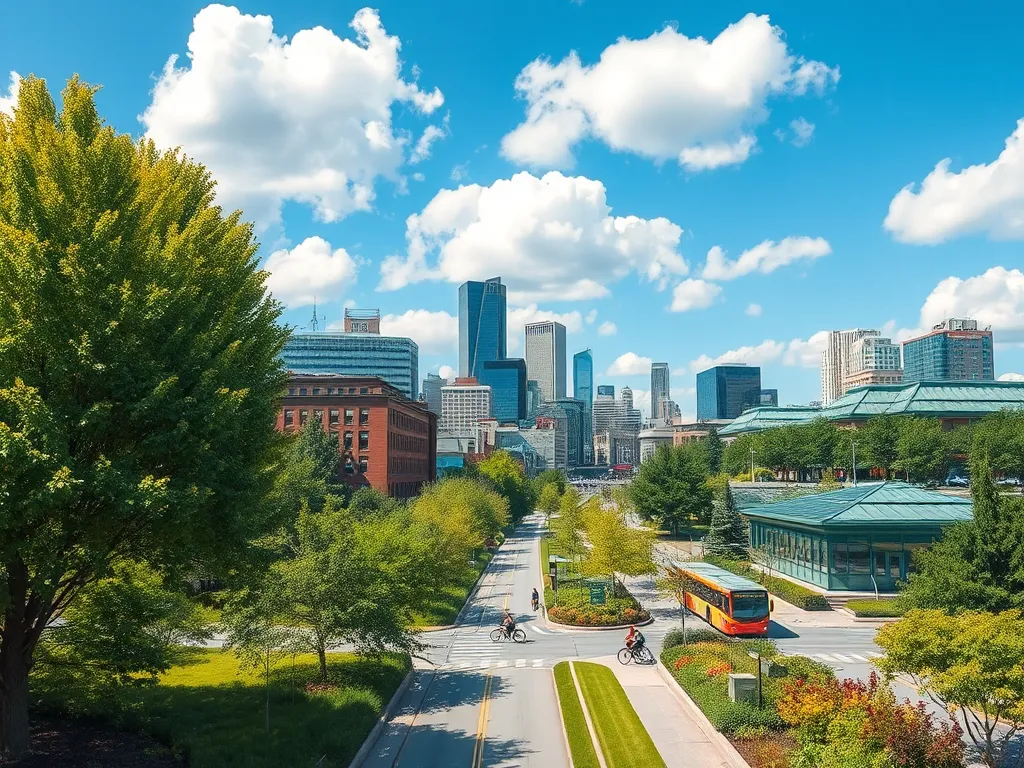Discover Canada's Green City Guide: Sustainable Urban Escapes

Green City Guide: Sustainable Urban Escapes in Canada's Major Cities
Canada is home to a diverse range of cities that not only boast vibrant cultures but are also making significant strides toward sustainability. The Green City Guide: Sustainable Urban Escapes in Canada's Major Cities highlights urban environments that prioritize eco-friendly practices, providing travelers with guilt-free options to explore. This guide emphasizes the innovative solutions cities are implementing to create sustainable living and exploration experiences.
Major cities like Toronto, Vancouver, Montreal, and Calgary are leading the way in incorporating green initiatives into their urban landscapes. The Green City Guide: Sustainable Urban Escapes in Canada's Major Cities showcases a variety of options for eco-conscious travelers—whether you're looking for outdoor adventures, educational experiences, or simply a chance to relax while surrounded by nature, these cities have something to offer every type of visitor.
The fusion of nature and urban life in Canadian cities creates a unique atmosphere for exploration. With extensive parks, dedicated biking trails, and sustainable transport options, the Green City Guide: Sustainable Urban Escapes in Canada's Major Cities encourages both locals and visitors to reduce their carbon footprint while enjoying the rich urban setting. From vibrant street art to bustling farmers' markets, there's no shortage of activities that emphasize sustainability and community engagement.
As cities continue to evolve towards a more sustainable future, they are adopting renewable energy initiatives and promoting eco-friendly accommodations. The Green City Guide: Sustainable Urban Escapes in Canada's Major Cities highlights the importance of supporting local businesses and sustainable practices in hospitality, ensuring your stay contributes positively to the environment. This article will delve into the sustainable transport options, green spaces, renewable energy initiatives, eco-friendly accommodations, and local sustainable food scenes—providing a comprehensive overview of how each city is working toward a greener future.
In conclusion, the Green City Guide: Sustainable Urban Escapes in Canada's Major Cities is a valuable resource for anyone looking to explore urban areas while minimizing their ecological impact. Whether you seek nature-filled adventures or urban exploration, embracing sustainability is easier than ever in Canada's major cities.
Sustainable Transport Options
Public transit systems in Canadian cities are designed to be efficient and eco-friendly. Cities like Toronto and Vancouver have invested in expanding their transit networks, making it easy for visitors to navigate urban areas without the need for a personal vehicle. Electric buses and trains reduce emissions and pollution, allowing travelers to contribute to cleaner air while enjoying their journeys across town.
Biking infrastructure has blossomed in major Canadian cities, with dedicated bike lanes and rental programs making cycling a safe and popular choice for transportation. Cities like Montreal have developed extensive cycling networks, encouraging both residents and tourists to explore on two wheels, offering a more intimate connection to the surroundings while reducing reliance on fossil fuels.
Car-sharing and electric vehicle options are becoming increasingly accessible in Canada’s urban centers. Programs like Zipcar and the rise of electric scooters allow travelers to have flexible transportation without the environmental costs associated with traditional car rentals. Many cities have created designated parking spots and charging stations to encourage the use of electric vehicles, further promoting sustainable travel.
Green Spaces and Parks
Canada's major cities are rich with beautiful urban parks that provide serene escapes from the bustling city life. Places like Stanley Park in Vancouver and High Park in Toronto offer not just a breath of fresh air but also habitats for local wildlife. These parks often host recreational activities like walking trails, wildlife watching, and community events, serving as vital community hubs.
Community gardens and green roofs have gained popularity in urban settings, promoting sustainability while enhancing aesthetics. These initiatives invite locals and tourists alike to engage with their communities while learning about gardening and biodiversity. Cities like Edmonton and Toronto are leading the way with numerous community gardens that focus on local produce, fostering a sense of community and a connection to food sustainability.
The environmental impact of urban green spaces cannot be overstated. These areas improve air quality, mitigate urban heat effects, and enhance residents' and visitors' overall well-being. By prioritizing green spaces, Canadian cities are working to create healthier environments that benefit everyone and foster a sense of connection with nature.
Renewable Energy Initiatives
Solar energy projects have become increasingly prevalent in urban areas across Canada. Cities like Calgary and Toronto have implemented solar panel installations on municipal buildings, schools, and rooftops, harnessing clean energy to power public services and contribute to sustainability goals. This not only reduces reliance on fossil fuels but also educates the community on the benefits of renewable energy.
Wind energy adoption is also making waves in city settings, with initiatives like community wind farms enabling urban areas to embrace renewable energy sources. Cities like Nova Scotia and Ontario are investing in wind energy technologies, diversifying their energy portfolios and contributing significantly to reducing carbon footprints.
City policies promoting renewable sources further demonstrate a commitment to sustainable energy. Many Canadian cities have established targets for greenhouse gas emissions reductions and are actively pursuing partnerships with businesses and residents to implement renewable energy solutions. These policy frameworks are crucial for transforming urban landscapes into more resilient, sustainable environments.
Eco-Friendly Accommodations
Travelers can rest easy knowing that eco-friendly accommodations are widely available across Canada. From green hotels to eco-lodges, many establishments prioritize sustainable practices, ensuring your stay aligns with your values. Hotels in cities like Vancouver and Montreal are earning recognition for their green certifications and initiatives focused on reducing waste and conserving energy.
Sustainable practices in hospitality include everything from implementing recycling programs and conserving water to sourcing food locally and utilizing green cleaning products. Many hotels are investing in energy-efficient appliances and renewable energy sources, allowing guests to enjoy modern amenities without compromising their eco-friendly commitments.
Certifications for eco-friendly lodging are essential for travelers seeking to ensure their accommodations meet sustainability standards. Organizations like Green Key and LEED provide a framework for distinguishing green hotels, a useful guide for choosing accommodations that prioritize sustainability.
Local Sustainable Food Scene
Farmers' markets play a pivotal role in promoting local produce and encouraging sustainable consumption in major Canadian cities. These markets provide access to fresh, organic foods while supporting local farmers and reducing food miles. Cities like Toronto and Vancouver have vibrant farmers' markets that should not be missed by any eco-conscious traveler.
Restaurants focusing on sustainable sourcing are increasingly popular, with many establishments taking pride in their commitment to local and organic ingredients. Dining at these restaurants not only supports sustainable agriculture but also allows visitors to experience the unique flavors and culinary talent found in these urban centers.
Cuisine highlighting local ingredients is a vital component of the local food scene, showcasing the diversity and richness of Canadian agriculture. Many restaurants emphasize using seasonal produce, supporting local economies, and reducing their ecological footprint, providing diners with delicious meals that reflect the region's unique culinary identity.
